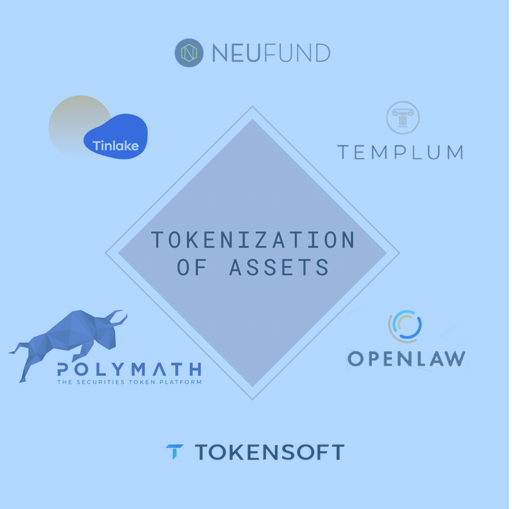If you look at the DeFi ecosystem through a wider lens, you can see that decentralized finance projects are working and developing in roughly twelve directions. Attempting to shift to a decentralized form of almost everything related to the traditional financial system also means trying to move as quickly as possible to new types of interactions with financial instruments and decentralization of these interactions.
In this article, we will discuss the digitalization of property rights, consider projects offering tools to create digital assets, and talk about the impact of tokenization on the capabilities of traditional financial instruments.
Asset Tokenization
Any assets, whether securities, shares, or real estate, possess certain value propositions. Financial assets are simpler to represent. This means that their value may differ depending on the assets in which they will be represented. It also means that the represented assets can be easily exchanged, transferred, or converted. With the rise of blockchain technology and the ability to perform functions such as tokenization and transaction execution, the process of representing assets has become much simpler and has led to new opportunities.
Asset tokenization is the creation of digital tokens with pledged value, the aggregate price of which should be equal to the value of the converted object (asset), with their further release for trade, transfer, or ownership.

Asset tokenization offers:
- Removal of territorial barriers;
- Absence of intermediaries;
- Investments without physical presence;
- Security;
- Privacy;
- Immutability;
- Accessibility.
To some extent, asset tokenization was already implemented long before the rise of the popularity of decentralized finance. For example, the Issued Assets (IA) tool in the Liquid sidechain allows you to create your own tokenized assets in any quantity, and the Confidential Assets protocol from Blockstream allows you to transfer these assets over the network without showing the other participants the volume of such transfers.
Polymath Network
Polymath is an ERC20-based blockchain platform that acts as a service provider for creating, issuing, and managing tokens. Polymath acts as a guide for issuers wishing to launch their token in accordance with all regulatory rules.
The Polymesh enterprise-owned PoS Blockchain, built specifically for creating and managing security tokens, ensures audit privacy, asset identification, security, and provides tools to enhance tokens’ management capabilities.

The project is working on optimizing ERC interfaces to include traditional assets. Polymath ST-20 standard is an extension of the ERC-20 standard and serves to increase the flexibility of assets, as well as has some additional features necessary for securities tokenization.
Neufund
Neufund is an Ethereum-based community platform connecting the blockchain space and investment sector. Neufund provides companies and startups with the infrastructure to release new types of assets by interacting with Ethereum smart contracts. The site offers the opportunity to invest in companies by purchasing equity tokens, the equivalent of shares. This procedure was called ETO (Equity Token Offerings) and allowed investors to acquire part of the ownership on the blockchain.

The Neufund platform provides tools for interaction between issuers and investors, which include updates, voting, additional rounds of financing, etc.
The platform has an internal NEU token, which investors can get as a reward for their contributions and use it to pay for services and participate in the platform development. In addition to the NEU protocol token, the EURT euro-pegged token is available on Neufund, which is the platform’s primary currency, in which users’ investments are denominated. However, companies can decide for themselves in what currency ETO will be held.
Templum
Templum is a platform for regulated trading of ICO-tokens classified as securities. The Company provides security-token issuance services in accordance with the regulators’ requirements.
Templum provides a regulated market infrastructure for digital assets, which includes a blockchain-supporting platform for fundraising and secondary trading. In 2018, Templum acquired an alternative trading system (ATS) Liquid M Capital, a platform for “tokenized assets” that allows users to trade cryptocurrencies under the U.S. securities rules.
Similar services in the tokenized asset market are provided by companies such as Coinlist, which hosted Filecoin’s first ICO regulated project, and Overstock, which offers initial coin placement services under SAFT procedures.
OpenLaw Finance
OpenLaw Finance is an open-source project that offers templates for concluding legal agreements with the help of smart contracts, as well as the possibility to launch personal legal tokenized financial products based on Ethereum blockchain.

OpenLaw Finance users can create and issue security-tokens, bonds, and other debt-based assets, intellectual derivatives, and tokenize goods. OpenLaw Finance is connected to a decentralized 0x exchange and has the essential tools to perform AML/KYC procedures.
Tokensoft
Tokensoft platform is another asset tokenization project, which offers tools for launching and selling tokens as well as a storage solution that provides secure administration of ERC-1404-compatible securities. In 2019, the U.S. Securities and Exchange Commission (SEC) granted Tokensoft permission to launch an investment bank to conduct operations with tokenized assets.
Tinlake
Tinlake allows you to use illiquid assets to gain access to finance and obtain loans on your own terms. Tinlake is a smart contract on the Ethereum network, which turns non-fungible tokens (NFT) into ERC-20 tokens with further access to decentralized credit protocols.

Tinlake provides the ability to combine NFTs and smart contracts and use them as collateral for borrowing stablecoins.
Conclusion
Asset tokenization is a long process of traditional financial instruments’ transition towards a blockchain space. The interaction of projects and companies in the field of tokenization with regulatory authorities and institutional companies’ interest in the field of decentralized finance indicate the prerequisites for wider adoption and popularization of blockchain technology, cryptocurrencies, and digital assets.
Smart contracts and blockchains can provide opportunities for the tokenization of financial, commodity, personal, illiquid, non-fungible, and interchangeable assets. Tokenization allows you to automate the transfer of ownership through smart contracts, which removes the need for intermediaries and saves costs by reducing the fees.
Creating an accurate legal and regulatory framework for tokenization will facilitate greater adoption of decentralized finance.














